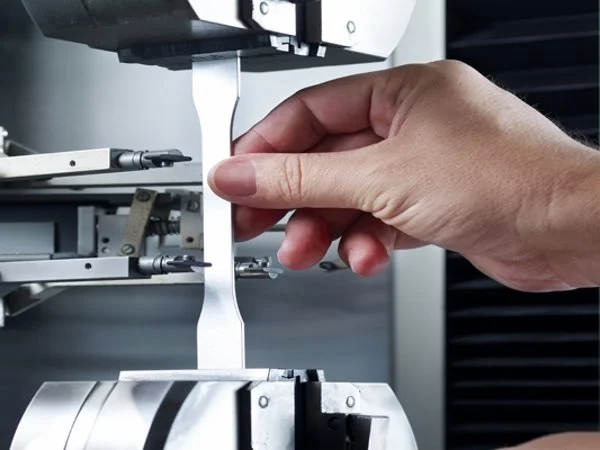Metallurgical & Mechanical Materials Testing
Metallurgical and mechanical materials testing is a critical component of quality assurance in the oil and gas sector. This service involves a range of tests designed to evaluate the physical properties, chemical composition, and mechanical strength of metals, alloys, and other materials used in this industry. The purpose is to ensure that these materials meet strict standards for durability, safety, and performance under extreme conditions.
Metallurgical testing focuses on analyzing the microstructure of metals using techniques such as optical microscopy or scanning electron microscopy (SEM). This helps determine the presence of impurities, grain structure, and any potential defects. Mechanical properties tests include tensile strength, hardness, impact toughness, and fatigue testing. These tests are essential in assessing how materials will perform under stress over time.
For compliance officers and quality managers, it is crucial to understand that the metallurgical examination of materials is not just about identifying flaws; it also involves predicting potential failure points before they occur. In the oil and gas industry, where equipment operates at high pressures and temperatures, these tests play a vital role in ensuring safety and preventing costly downtime.
The mechanical properties testing ensures that materials can withstand the harsh environments typical of offshore drilling platforms or deep-sea pipelines. These tests help determine if the materials used are fit for purpose and capable of withstanding wear and tear over extended periods without failing. Understanding these aspects is crucial for R&D engineers who need to innovate new alloys that can meet both current performance standards and future challenges.
Procurement teams should also be aware that sourcing high-quality materials directly impacts the longevity and reliability of equipment used in oil and gas operations. By leveraging metallurgical tests, procurement professionals can make informed decisions about suppliers and ensure they are receiving materials that adhere to international standards such as ISO 15146 or ASTM E8.
Why It Matters
The importance of metallurgical and mechanical materials testing cannot be overstated, especially within the oil and gas sector. Ensuring that materials used in this industry meet stringent quality standards is paramount to operational safety and efficiency. For instance, a single failure point in a pipeline due to insufficient material strength could lead to catastrophic consequences, including environmental disasters and significant financial losses.
Metallurgical testing plays a key role in identifying any potential issues with the materials used in various components of oil rigs or drilling equipment. By detecting flaws early on through these tests, operators can take corrective actions before they escalate into larger problems. This proactive approach not only enhances safety but also contributes to reducing maintenance costs and downtime.
In terms of mechanical properties testing, it ensures that all parts involved in the extraction process are capable of enduring the rigors associated with their respective tasks. Whether it's ensuring a valve can withstand high-pressure conditions or verifying that bolts are strong enough under load, these tests provide assurance about the reliability of each component.
For compliance officers and R&D engineers, metallurgical testing provides valuable insights into material performance under real-world conditions. This information is invaluable for refining existing materials and developing new ones tailored specifically to meet the unique demands faced by this industry. Additionally, it helps in complying with regulatory requirements set forth by bodies like OSHA or API.
For procurement teams, knowing that their suppliers adhere to rigorous testing protocols gives peace of mind regarding the quality of materials they are acquiring. This ensures that only high-quality components enter into use, ultimately contributing towards safer and more efficient operations across all levels of oil & gas production processes.
Eurolab Advantages
At Eurolab, we offer comprehensive metallurgical and mechanical materials testing services tailored specifically for the oil and gas sector. Our state-of-the-art facilities equipped with advanced instrumentation ensure precise measurements and accurate results. With experienced technicians who possess extensive knowledge of both theoretical principles and practical applications, you can rest assured that your materials will receive thorough examination.
Our commitment to excellence extends beyond just performing tests; it includes providing detailed reports that not only present findings but also offer recommendations based on those results. This allows our clients to make informed decisions regarding their material selection process confidently knowing every aspect has been thoroughly evaluated.
We pride ourselves on maintaining strict adherence to international standards such as ISO 15146 and ASTM E8, ensuring all tests conducted are consistent with industry best practices. Furthermore, we continuously invest in training our staff members so that they stay updated on the latest advancements within this field, allowing us to deliver cutting-edge services that meet current and future needs.
By choosing Eurolab for your metallurgical and mechanical materials testing requirements, you gain access to expert advice from experienced professionals who understand both the theoretical underpinnings and practical implications of material science. Whether you're a compliance officer looking to ensure regulatory compliance or an R&D engineer seeking innovative solutions, our team is here to support every step of the way.
Frequently Asked Questions
- Optical Microscopy
- Scanning Electron Microscopy (SEM)
- X-ray Diffraction Analysis
- Tensile Strength Tests
- Impact Toughness Measurements
- Fatigue Testing
- Hardness Testing: Vickers or Rockwell Scales
- Fracture Mechanics Evaluations





